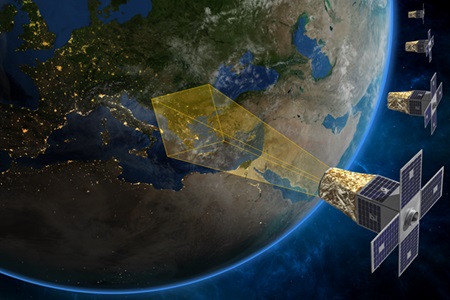 Open Cosmos, a provider of space missions and data, has secured a €60m contract to deploy an Earth Observation Constellation consisting of seven satellites which will supply daily high-resolution and very-high-resolution imagery.
Open Cosmos, a provider of space missions and data, has secured a €60m contract to deploy an Earth Observation Constellation consisting of seven satellites which will supply daily high-resolution and very-high-resolution imagery.
This flagship project forms part of the Hellenic Government’s procurement of an advanced satellite constellation, demonstrating its commitment to delivering economic and environmental benefits for Greece and European citizens at large. The data collected from this constellation will be instrumental in improving public services such as the land registry, combating sea pollution, and increasing agricultural efficiency.
The seven satellites in the Greek constellation will gather data from a multisensor instrument suite in low earth orbit, including very-high-resolution optical multispectral and hyperspectral cameras, Internet-of-Things (IoT) and Automatic Identification System (AIS) receivers, complemented by on-board Artificial Intelligence, to maximise efficiency. The programme will be delivered in partnership with the European Space Agency and complement existing systems such as EU Copernicus, while being fully compatible with the Atlantic Constellation.
The Minister of Digital Governance, Dimitris Papastergiou, said: “Greece is making significant steps in Space. By investing in both capacity-buying and capacity-building space programs, our aim is to stimulate local high-tech space industries, foster job creation, retain our skilled engineers and space experts in the country and attract additional talent. The development of cutting-edge satellite technology will cultivate a sustainable economic framework that integrates advanced science and technology sectors, bolstering long-term economic resilience in the country.”
Open Cosmos was founded in 2015 with a mission to address global sustainability challenges by making actionable information from space available to everyone. Part of this vision is the OpenConstellation, a mutualised constellation, set to become the largest shared infrastructure in space.
Rafel Jorda Siquier, Founder and CEO of Open Cosmos, added: “It is an honour to be chosen for such a crucial programme for Greece and I’m incredibly proud of the team’s achievement in securing this contract. We faced competition from some of the world’s leading players in the industry, and to win is a true testament to the hard work of everyone at Open Cosmos and the strength of our advanced satellite technology. Delivering this contract will position us at the forefront of satellite data providers, opening up further collaborations and growing the OpenConstellation.”
The satellites will be built and operated by Open Cosmos Aegean, a new manufacturing centre which will enhance sovereign capabilities in satellite technologies and attract further investment to the country. By overseeing regional sales and complementing other European operations, it will play a crucial role in future European and international programmes.
Dr Maria Kalama, Director of Open Cosmos Aegean, stated: “We have created a vibrant ecosystem of suppliers and service providers around us, in every country we are present, and Greece will be no exception. We would like to thank all partners for their contribution to securing this contract, and in particular our main collaborators in Greece, Nova ICT, EMTECH-Space, the Libre Space Foundation, Planetek Hellas, Adamant Composites and Priority consultants.”
Simonetta Cheli, Director of the Earth Observation programmes at ESA, commented: “The assignment of the development of the Greek Constellation to Open Cosmos is proof of the Agency’s continuous commitment in supporting National initiatives from the ESA Member States, in close coordination with the National Authorities and on compressed timescales. ESA has the unique ability to maximise the cross-benefit of all such initiatives by providing a unified framework for observations exchange among and for the benefit of Member States.”
The new contract marks a major milestone for Open Cosmos, known for its innovative solutions that lower the barriers to space access. The company now has four offices, including its HQ at the Harwell Space Campus in the UK, Spain, France and Greece. It has been delivering key missions for the UK, including building the UK Pathfinder satellite for the Atlantic Constellation. The UK now has an opportunity to be a contributor to European EO systems following the country rejoining the Copernicus programme last year, which is vital in tackling global challenges.
In addition, Open Cosmos is building satellites in Portugal which will also monitor the Atlantic Coast. Critical data gathered through satellite monitoring will become part of the DataCosmos platform, which offers AI-powered data analysis from a growing range of satellite sources and analytic partners to lower costs and simplify access to EO data.














Add Comment